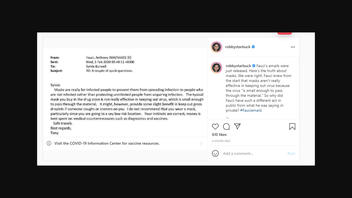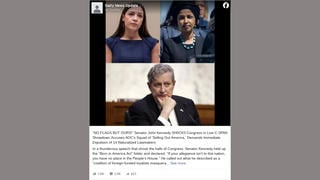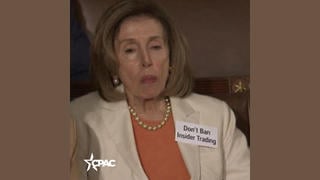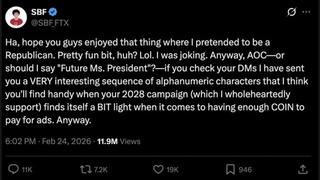
Does Dr. Anthony Fauci's private email on masks, dated February 2020, conflict with what he was saying publicly around that time? No, that's not true: His email was consistent with the guidance given then. Since the start of the COVID-19 pandemic, recommendations on masks have evolved as the science on the virus becomes more clear and the situation changes.
Health officials in the United States initially discouraged masking, to prevent hospital shortages, but reversed course in April 2020. Fauci's email fell before that switch, at a time when there were very few confirmed cases of COVID-19 in the United States.
The claim appeared in an Instagram post (archived here) published on June 2, 2021. The post included an email from Fauci, the nation's top infectious disease expert, as well as an introductory message that read:
Fauci's emails were just released. Here's the truth about masks. We were right. Fauci knew from the start that masks aren't really effective in keeping out virus because the virus 'is small enough to pass through the material.' So why did Fauci have such a different act in public from what he was saying in private?
Users saw this on social media at the time of writing:
On June 1, 2021, BuzzFeed News and The Washington Post published thousands of pages of pandemic emails, spanning January to June 2020. The post picks up one of those emails, written by Fauci on February 5, 2020. That email reads:
Masks are really for infected people to prevent them from spreading infection to people who are not infected rather than protecting uninfected people from acquiring infection. The typical mask you buy in the drug store is not really effective in keeping out virus, which is small enough to pass through the material. It might, however, provide some slight benefit in keep out gross droplets if someone coughs or sneezes on you. I do not recommend that you wear a mask, particularly since you are going to a very low risk location.
The post is missing important context.
At the time the email was written, February 2020, there were almost no confirmed cases of COVID-19 in the United States. From January 21 through February 23, 2020, public health agencies detected 14 cases, all connected to travel from China. The first nontravel-related U.S. case was confirmed on February 26, 2020.
The post is also wrong: Fauci's email is consistent with comments he made publicly around the same time and with the guidance given then.
In early March 2020, he told CBS' "60 Minutes" that masks should largely be reserved for health care workers and that healthy people need not wear them. Here is a part of Fauci's conversation with CBS News chief medical correspondent Dr. Jonathan LaPook:
LaPook: There's a lot of confusion among people and misinformation surrounding face masks, can you discuss that?
Fauci: The masks are important for someone who's infected to prevent them from infecting someone else. Now, when you see people and look at the films in China and South Korea whatever, everybody's wearing a mask. Right now, in the United States, people should not be walking around with masks.
LaPook: You're sure of it? Because people are listening really closely to this.
Fauci: Right now, people should not be worried. There's no reason to be walking around with a mask. When you're in the middle of an outbreak, wearing a mask might make people feel a little bit better and it might even block a droplet, but it's not providing the perfect protection that people think that it is. And often there are unintended consequences. People keep fiddling with the mask and they keep touching their face.
LaPook: And can you get some schmutz sort of staying inside there?
Fauci: Of course, but when you think mask, you should think of health care providers needing them and people who are ill. The people who, when you look at the films of foreign countries and you see 85% of the people wearing masks that's fine, that's fine. I'm not against it, if you want to do it, that's fine.
LaPook: But it can lead to a shortage of masks?
Fauci: Exactly. That's the point. It could lead to a shortage of masks for the people who really need it.
A month later, in April 2020, federal health officials reversed course and started recommending Americans wear masks outside their homes to help stem the spread of COVID-19. That change was made as case counts were rising and as scientists were gaining a greater understanding of exactly how the virus spreads.
The Centers for Disease Control and Prevention (CDC) updated its website to include recommendations on masks, which are described as a two-way street. They help protect the person wearing the mask as well as those around them. While not 100% effective, masks increasingly came to be seen as a critical tool.
Of note: The CDC recently changed its guidance on masks for people who have been fully vaccinated. At the time of writing, June 2, 2021, the CDC says that fully vaccinated people can resume activities without wearing a mask or physically distancing, but still encourages unvaccinated people to protect against the virus by wearing masks. Read more on that here.
The point is that recommendations on masks have evolved throughout the pandemic. Fauci, like other federal officials, did not initially encourage them but reversed course in April 2020. His email that discouraged masking was dated February 2020, meaning that there is no contradiction between what he was saying privately and what he was telling the public around that time.















